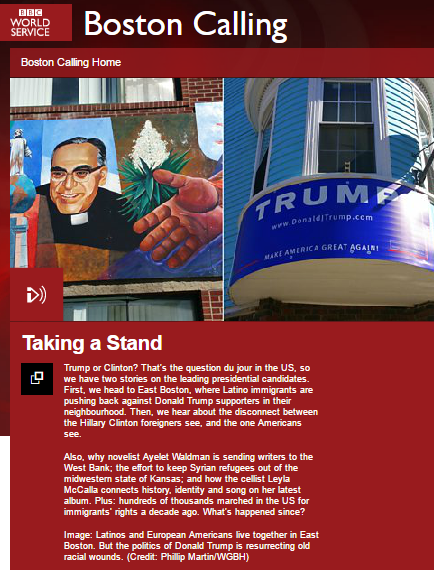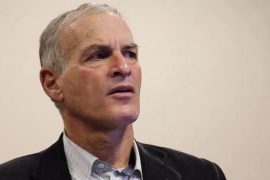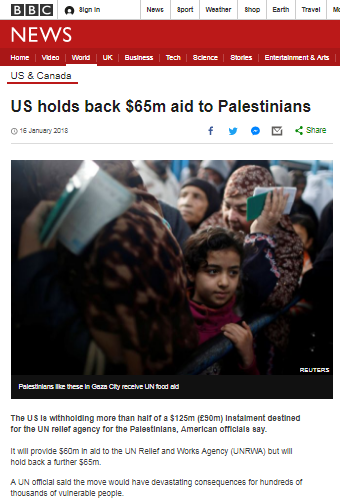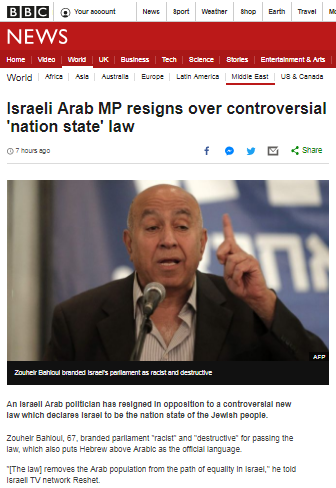The May 7th edition of the BBC World Service radio programme ‘Boston Calling’ included an item (from 09:44 here) described by presenter Marco Werman in the introduction to the show as follows:
“This week: taking a stand – from an Israeli-born author writing about the occupation of the West Bank.”
That simplistic sound bite “the occupation” was repeated in Werman’s introduction to the item itself, with no effort made to inform listeners of the background history and context to the subject which is essentially at the story’s core.
“So here are a couple of lines you hear all the time when American politicians talk about the Middle East: ‘the United States stands with Israel’ and ‘Israel is America’s most important ally in the region.’ It’s a topic that both Hillary Clinton and Donald Trump will surely have to address quite a bit in the coming months. And so too will the Israeli-born author Ayelet Waldman. Waldman is a writer best known for her frank essays and books about love, motherhood and abortion but her latest project is a stark departure from all that. She’s collaborating with her husband, the novelist Michael Chabon, on a book of essays coming out next year to mark fifty years of Israel’s occupation of the West Bank. Daniel Estrin sat down with Waldman on a recent trip to the region to talk about her complicated relationship with her homeland.”
Estrin’s report begins with portrayal of Waldman’s background, including the following description of her short-lived return to the country she had left as a toddler.
DE: “After she graduated from Wesleyan she moved to Israel to live on a kibbutz.”
AW: “And that’s when the kind of the cracks started appearing in the wall.”
DE: “As a feminist she noticed there wasn’t true gender equality on her kibbutz. She moved back to the US and enrolled in Harvard Law School.”
Notably, that portrayal bears little resemblance to the one Waldman gave in an interview with Haaretz two years ago.
“She was born in Jerusalem in 1964, and even though her parents returned to Canada when she was two and a half years old, she had several encounters with Israel, including a failed six-month attempt at aliya in 1986. “The kibbutz killed me,” she says. “It was a kibbutz of yekkes — Jews of German origin. It was a lovely place with nice people, but yekkes pass each other without saying hello.””
Later Estrin tells listeners:
“Things changed two years ago when Waldman was invited to a writers’ conference in Jerusalem. She went on her first trip to the West Bank city of Hebron. What she saw shocked her; the reality of many hard-line Israeli settlers living among the Palestinian urban population.”
Estrin makes no effort to provide BBC World Service audiences with any information concerning Hebron’s long Jewish history (including the 1929 massacre) or to bring in the very relevant context of the Oslo Accords which would enable them to understand why Israelis live in Hebron. Neither does he inform listeners that the trip Waldman took to Hebron in 2014 was organised by the foreign-funded political NGO ‘Breaking the Silence’.
Listeners then hear the following stereotyping of Jewish residents of Hebron from Ayelet Waldman:
“This graffiti. These horrific gr…this graffiti, you know, ‘death to Arabs’. Vicious, angry, thugs wearing yarmulkes. I mean, they’re thugs. Like – and I know from [sic] thugs. I was a public defender. Like, I know what a thug looks like. I know what a bully looks like. I know what a criminal looks like. Those are thugs.”
It is of course difficult to imagine that the BBC would broadcast such a crude – and entirely unchallenged – stereotype were it to relate to other ethnic/religious groups but not only did it do just that in this programme; it also saw fit to include the same segment in a clip from the item promoted separately on Twitter.
So what BBC World Service listeners were fed in this item is the context-free story of an author with links to Israel who, together with her husband and other writers, is in the process of compiling what Estrin describes as “a collection of essays from top writers with something new to say about a military occupation fifty years in the making”. But what is really interesting about this BBC report is what it did not tell listeners.
Daniel Estrin was of course not the only journalist accompanying Waldman et al on their much publicised road-show-cum-book promotion. The Washington Post’s William Booth was also there and, despite the many issues arising from his report, he did at least bother to inform his audience of the involvement of ‘Breaking the Silence’ in Waldman’s project. So did the Guardian and – particularly remarkably – so too did Daniel Estrin in the almost identical version of this report broadcast on the BBC’s partner station PRI.
The part of Estrin’s report which was cut from the BBC World Service programme tells listeners that:
“The book project is organised in part by ‘Breaking the Silence’ – an Israeli veterans group that’s controversial here because it’s critical of Israel’s occupation of the West Bank. And Waldman herself has stirred up controversy among some American Jews on Twitter this month, drawing rebukes from prominent journalist Jeffrey Goldberg.”
(Details of that latter story concerning Waldman’s stereotyping of Israel’s “national character” as “dickish” can be found here.)
Whilst Estrin’s explanation of why ‘Breaking the Silence’ is considered controversial in Israel is whitewashed to the point of inaccuracy, he does at least clarify the political NGO’s involvement in this project, enabling informed listeners at least to comprehend that Waldman’s “collection of essays” is not a literary exercise but political agitprop.
The question that therefore arises is why did the BBC World Service edit out that very relevant piece of information from its promotion of this project?
Related Articles:
Washington Post’s Letter from Israel Should be Marked ‘Return to Sender’ (CAMERA)
Thinly disguised promotion of anti-Israel activism on BBC WS ‘Boston Calling’




